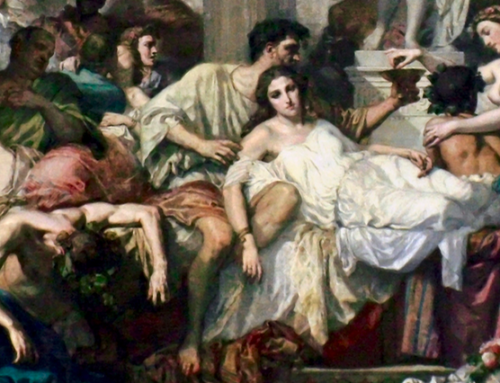There can be no freedom absent some authority. Conservatives and libertarians alike may locate that authority in mediating institutions of modest size, recognizing the importance of consent and localism, family and place, to good government. Sir Roger Scruton’s example shows that certain conservative cultural conditions enable market-based economies to flourish.
 The room is alive with happy discussion, the clanking of plates and silverware, hearty laughter, and the pitter-patter of smartly dressed servers buzzing about the room. Wine flows. We’re on the final course, awaiting dessert and coffee, when suddenly the lights dim, leaving dancing candlelight on the tables and the illicit glow of cell phones. On an enormous screen behind the stage comes a loud, hoarse voice: “It is a great honor to be named Defender of Western Civilization.”
The room is alive with happy discussion, the clanking of plates and silverware, hearty laughter, and the pitter-patter of smartly dressed servers buzzing about the room. Wine flows. We’re on the final course, awaiting dessert and coffee, when suddenly the lights dim, leaving dancing candlelight on the tables and the illicit glow of cell phones. On an enormous screen behind the stage comes a loud, hoarse voice: “It is a great honor to be named Defender of Western Civilization.”
I look up, puzzled. There before me in magnified form, filling the screen, is Sir Roger Scruton, sitting beside a lamp, his face framed by a flux of flaxen hair, his chair squeaking as he readjusts himself. It’s evening, both here and in England, and the sun is down, so the faint light beaming on his face through an obscured window betrays the disappointing reality that we’re watching a recording, not a live feed. The moment, at any rate, is exciting. Scruton goes on to ask, “What is a civilization?” And to answer: “It is surely a form of connection between people, not just a way in which people understand their languages, their customs, their forms of behavior, but also the way in which they connect to each other, eye to eye, face to face, in the day-to-day life which they share.”
That, anyway, is how I recall the Intercollegiate Studies Institute’s 14th Annual Gala for Western Civilization that honored Scruton, who, because of his chemotherapy treatment, was unable to attend.
Sir Roger, as he’s affectionately known, departed from this world on January 12, 2020. This erudite philosopher of a bygone era raises grave questions about the compatibility between traditionalism and classical liberalism, custom and markets, the individual and the state, convention and innovation. From Scruton, we can, I think, learn the following. That a society of modest scope and scale functions optimally when its people are good and virtuous, when they voluntarily organize themselves into charitable communities, fearing the eternal consequences of wickedness. That free societies thrive where crime is rare and private property rights are both recognized and respected, where families work hard and support one another and leaders are classically and rigorously educated, having wrestled with the greatest thinkers and texts from across the ages. That lasting social harmony develops in cohesive communities where solidarity involves kindness and benevolence and members do not superciliously dismiss received wisdom and norms.
Scruton’s Fools, Frauds and Firebrands—first published in 1985 as Thinkers of the New Left, reworked and rereleased in 2015, produced in paperback in 2016, and reissued in 2019 as yet a newer edition—demonstrates that Scruton wasn’t tilting at windmills as conservative pundits and talking heads on television and popular media seem too often to do. Scruton’s chief targets were, not senseless and sycophantic politicians, but ideas. He traced these ideas to particular leftist luminaries: Eric Hobsbawm, E. P. Thompson, J.K. Galbraith, Ronald Dworkin, Jean-Paul Sartre, Michel Foucault, Jürgen Habermas, Louis Althusser, Jacques Lacan, Gilles Deleuze, Antonio Gramsci, Edward Said, Alain Badiou, and Slavoj Źižek. His concern was principally philosophical and cultural. He took ideas seriously and didn’t simplify or exploit them merely for entertainment value.
Scruton acknowledged that the term “Left,” referring to the object of his opprobrium, covers a wide range of intellectuals and ideological movements, but that all of these, to some degree, “illustrate an enduring outlook on the world, and one that has been a permanent feature of Western civilization at least since the Enlightenment, nourished by … elaborate social and political theories,”[1] namely those which hold “that the goods of this world are unjustly distributed, and that the fault lies not in human nature but in usurpations practiced by a dominant class.”[2] The word “Left” or “leftist,” then, suitably encompasses a multiplicity of views that, although singular in their particulars, hang together as a classifiable category at a certain level of generalization.
Scruton added that leftists “define themselves in opposition to established power, the champions of a new order that will rectify the ancient grievance of the oppressed,”[3] and that they pursue two abstract goals: liberation and social justice. The liberation Scruton refers to is not necessarily a libertarian version of personal autonomy; rather, it refers to “emancipation from …. ‘structures,’” e.g., from “the institutions, customs and conventions that shaped the ‘bourgeois’ order, and which established a shared system of norms and values at the heart of Western society.”[4] The Left seeks to deconstruct and dismantle historic associations (families, churches, clubs, sporting leagues, etc.) that provide order and stability in the absence of overarching government rules and regulations.
If that’s “the Left” in a nutshell, then what’s “the Right,” according to Scruton? In short, the Right is a community of individuals believing in the primacy of those personal relationships, prevailing norms, and controlling institutions that precede government, mediate between private actors and the State, and celebrate the intrinsic worth of every human being. “The right,” explains Scruton, “rests its case in representation and law,” advocating a “civil society that grows from below without asking permission of its rulers.”[5] The Right, accordingly, treats government as accountable to its citizens in light of its dangerous capacity for mischief and violence. The Right also recognizes the sinful, flawed nature of human beings and, therefore, attempts to offset or neutralize—rather than to amass or centralize—power.
By contrast, the Left promotes institutionalized coercion and centralized power. Its attempts to realize concretely the abstractions of social justice and equality necessitate the use of a forcible apparatus, controlled by a select group of people, to press resistant communities into compliance. “Who controls what and how in the realm of pure equality,” asks Scruton on this score, “and what is done to ensure that the ambitious, the attractive, the energetic and the intelligent do not upset whatever pattern it is that their wise masters might impose on them?”[6] No true and absolute equality of talent or wealth can ever be achieved in tangible reality because humans are wonderfully and brilliantly diverse, even as they are made, universally, in the image of God.
Given a binary choice between the Left and the Right so described, libertarians ought to side with the Right, cultivating a literate society characterized not only by self-ownership, free markets, and private property, but also by aesthetic appreciation, religious worship, obedience to successful and constructive customs, and concern for the souls and material wellbeing of the generations not yet born. Libertarians and conservatives can agree that everyone is plugged into vast networks of commerce and activity, however remote their neighborhoods or habitats. They can agree with Scruton that self-regulating, disciplined communities of caring individuals administer felt, proportional restraints more fairly and efficiently than do faraway government bureaucrats or impersonal agencies of mechanical functionaries who enjoy a compulsory monopoly on the implementation of force.
Scruton suggested that the Right, more than the Left, benevolently esteems the multiplying, bewildering variety of human behavior and interests. Whereas the Left reduces human beings to determined products of intractable systems and rigid social structures, the Right marvels in the mystery of quotidian experience, mining the past for evidence of good and bad decisions, prudent and imprudent courses of action, and workable and unworkable approaches to difficult challenges and exigent circumstances.
There can be no freedom, however, absent some authority. Conservatives and libertarians alike may locate that authority in mediating institutions of modest size, recognizing the importance of consent and localism, family and place, to good government. Scruton’s example shows that certain conservative cultural conditions enable market-based economies to flourish. Conservatives and libertarians may agree that, in Scruton’s words, “[Ludwig von] Mises and [Friedrich] Hayek between them destroyed the possibility of a socialist economy,” giving the “conclusive argument against it.” Mises’s and Hayek’s argument, a tenet of the Austrian School of Economics, involves the recognition that humans are fallible creatures with limited knowledge and perspective who prosper when society writ large values humility over hubris, and economic exchange over warfare or coercion.
Despite the rancor between them lately, conservatives and libertarians need each other. Dividing them unites the Left. Scruton was no libertarian, but his ideas, if thoughtfully considered by libertarians, could enable a more fruitful, contemplative, and beautiful libertarianism to emerge.
[1] Pg. 1.
[2] Pg. 3. Note: I have Americanized Scruton’s spelling so that, for instance, “practised” has become “practiced.”
[3] Pg. 3.
[4] Pg. 3.
[5] Pg. 286.
[6] Pg. 274.
The Imaginative Conservative applies the principle of appreciation to the discussion of culture and politics—we approach dialogue with magnanimity rather than with mere civility. Will you help us remain a refreshing oasis in the increasingly contentious arena of modern discourse? Please consider donating now.
The featured image is courtesy of Creative Commons and is licensed under CC BY-SA 2.0.







Although the title of this article is somewhat misleading, the substance is sound, albeit a bit outdated. The libertarian world is now clearly divided between paleolibertarians who would concur with the insights of Roger Scruton, and left-libertarians. The “paleos” are the libertarians who would most likely be well versed in Austrian Economics, which means that singling out Austrians is somewhat like preaching to the choir. A very strong statement of the “paleo-Austrian” (my coinage?) line on broader societal issues can be found in Lew Rockwell’s recent tract Against the Left, which is largely his commentary on selected quotes by Mises and Rothbard on the destructive effect of recent expansions of state authority on the social fabric. Note that when reputed “Austrians” drift towards the center or even center-left, and of course there are such, it is usually correlated with a loosening of the methodological assumptions of Misesian praxiology. Conversely, there are a few thinkers who want to turn “Praxiology”” into a Theory of Everything (TOE) at the expense of any contextualizing religious or philosophical foundation. However this latter is a fringe preoccupation and not something characteristic of the core Austrian approach.
I’m in entire agreement with Russell Kirk in his essay “A Dispassionate Assessment of Libertarians”. True libertarianism has nothing to do with conservatives. It’s just an ideology – in the voegelian sense – which transforms private property (or the ‘no harm’ principle) in an absolute, above everything truly human or from God. Also, their dream of a society without any vestige of coercive authority is something contrary to any tradition, which we have never seen in history (even the most medieval descentralized governments – like Alfred the Great’s – had their level of coercive government: it was never “everything by itself”).
When we abandon the ideology, we have no need to call ourselves libertarians anymore. A conservative already is skeptical of government, and an intelligent one recognizes the need of the free-market (although neither ideologically and extreme). Thinkers like Burke and Tocqueville already conveyed us these insights, and they were conservatives, and conservatives consider them as such.